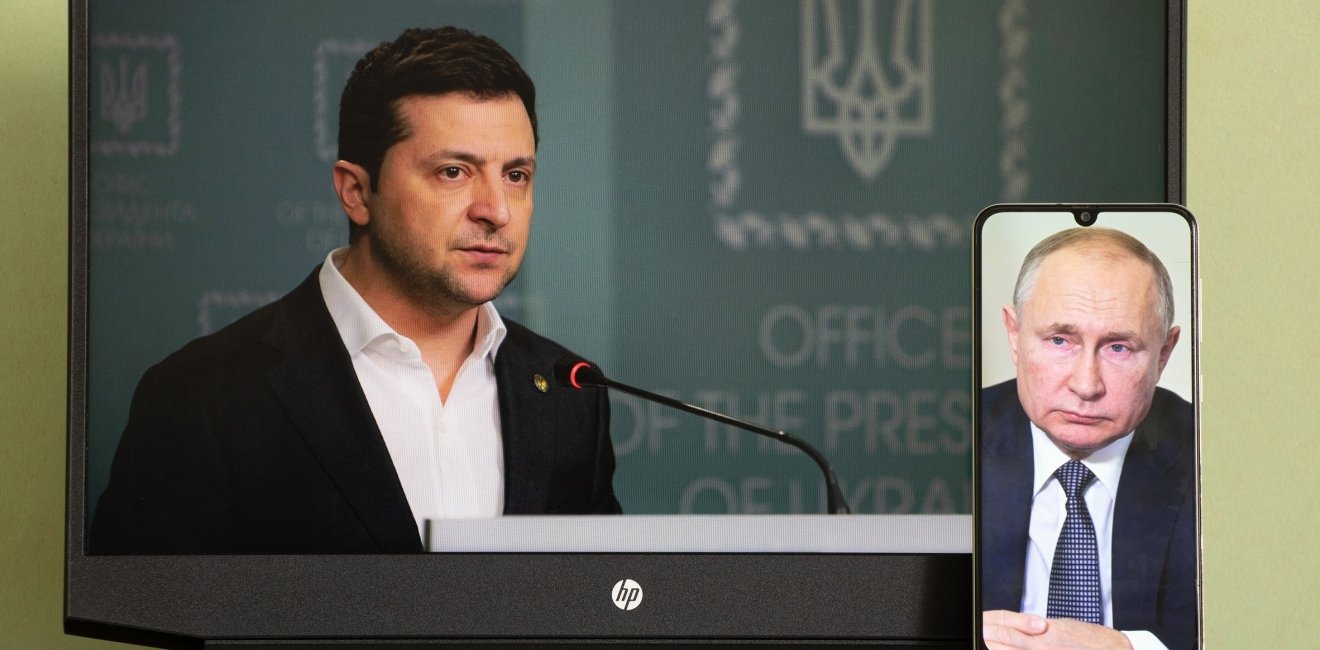
A blog of the Kennan Institute
BY MIKHAIL MINAKOV
Russia’s war on Ukraine is a historical event that impacts directly on the lives of Ukrainians and Russians, but also on the political geography of Europe and on international politics globally. The war marks the end of a period that could be termed “post-Soviet” in the region and the start of an as yet unnamed but so far tragic period for Europe and Eurasia.
I have no doubt that the war was a product of numerous powerful systemic forces—from institutional and political to structural and economic. Still, the war’s first forty-five days have illustrated the crucial role of personality in deciding the course of history: the figure of Ukraine’s president Volodymyr Zelensky has proven to be a decisive factor in shaping the force of the Ukrainian resistance, while the figure of Russia’s president Vladimir Putin has been a major factor in shaping Russia’s military failures.
The Zelensky Factor
In the first half of his term, Zelensky went through several stages of popularity. As a decisive winner in the 2019 presidential elections, he united Ukraine’s East and West, city dwellers and rural inhabitants, rich and poor. However, in both January 2021 and January 2022 his approval ratings fell well below 30 percent, as most Ukrainians thought the country was going in the wrong direction.
But while as a peacetime president, Zelensky exhibited strengths and weaknesses, as a wartime president, he came into his own. Zelensky has turned out to be a tough and courageous wartime leader, perfectly meeting the nation’s needs for firm leadership. Despite world leaders’ numerous urgings, he has refused to leave Ukraine, both before and after the start of the Russian invasion. He remained in Kyiv, despite anticipated assassination attempts, and has day after day served as a model of resistance to the personal and national existential threat. In numerous conversations, Ukrainian soldiers, activists, and businessmen have told me that they joined the defense because the president did not flee. Zelensky inspired Ukrainians to unite around him and defend Ukraine.
Zelensky has also used his best leadership and performance abilities to unite the international community around the cause of defending Ukraine and restoring the international order. In his addresses to Western parliaments, international summits, and UN meetings, Zelensky has transformed Zoom from a pandemic-era utility into a tool to win the hearts and minds of global leaders and people of good will worldwide. Ukraine’s unprecedented internal solidarity, as well as the growing military and humanitarian support from NATO, the United States, and the EU, are in many ways the personal achievement of Zelensky.
It comes as no surprise, then, that his public approval rating in Ukraine and abroad has skyrocketed. Well over 90 percent of Ukrainians trust him, and he is now the most popular politician in the United States, with more than 70 percent of Americans surveyed expressing confidence in him.
The Putin Factor
A contrasting picture emerges from the failures of the Russian troops in Ukraine, which in many ways stem from Putin’s personal miscalculations. A mature politician and enduring autocratic ruler, Putin has enormous experience in politics and international relations. However, as an authoritarian figure who lives in a bubble and is isolated from Russian society and the rest of the world, he has become hostage to his own regime and ideological beliefs.
Putin’s recent speeches and writings show the depth of the ideological trap in which he finds himself. The illusion that “Russians and Ukrainians are one people” has clashed with the reality in Ukraine. It seems that the Kremlin’s plan A was based on the expectation that the citizenry and political elites of Kyiv, Chernihiv, Sumy, Kharkiv, Mariupol, or Mykolaiv would welcome the invaders. The Kremlin expected Zelensky to flee or surrender. The strength of Ukraine’s leadership, armed defense, and civilian resistance presented a stark challenge to the aging dictator’s personal beliefs.
To Putin, his army’s unprovoked invasion of another country is a “special military operation,” not a war. The thousands of killed Ukrainians and the millions of those made refugees have not moved Putin to change his preferred vocabulary. The thousands of Russian protesters and the silent disapproval of hundreds of thousands more have not made him reconsider his beliefs. To help ensure that Putin’s illusion prevails over reality, his regime has introduced legislation criminalizing the use of the word war and any disapproval of the war he has launched.
When illusions do not match reality, people tend to respond with violence in an attempt to punish the reality. If the person is a political leader with no institutional, legal, or moral constraints on his decisions and actions, the violence can reach unfathomable levels, damaging the lives of many people. This is likely the source of the ferocity and viciousness demonstrated by Russian troops in Mariupol, Bucha, and other Ukrainian locations they occupy. And this is definitely the source of Putin’s complete denial of his own responsibility for the massacres in Ukraine.
As Putin’s war against Ukraine and the international conflict it has produced evolve, both the structural factors and the personality factors involved in them will be tested. Zelensky’s resilience will be tested in particular by the next stages of military action and by the economic hardships sustained by the Ukrainian people. A coming socioeconomic crisis and war losses will test Putin’s abilities. There is reason to believe that the personality factor will be increasingly important to the future of Ukraine, Russia, and the world we live in.
The opinions expressed in this article are those solely of the authors and do not reflect the views of the Kennan Institute.
Author


Kennan Institute
After more than 50 years as a vital part of the Wilson Center legacy, the Kennan Institute has become an independent think tank. You can find the current website for the Kennan Institute at kennaninstitute.org. Please look for future announcements about partnership activities between the Wilson Center and the Kennan Institute at Wilson Center Press Room. The Wilson Center is proud of its historic connection to the Kennan Institute and looks forward to supporting its activities as an independent center of knowledge. The Kennan Institute is committed to improving American understanding of Russia, Ukraine, Central Asia, the South Caucasus, and the surrounding region through research and exchange. Read more

Explore More in Focus Ukraine
Browse Focus Ukraine
Talking to the Dead to Heal the Living

Ukrainian Issue in Polish Elections


